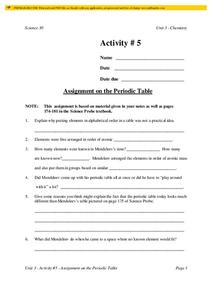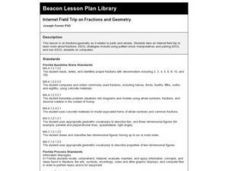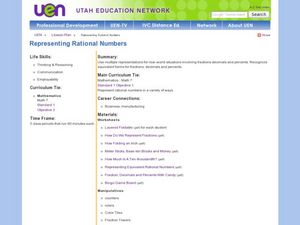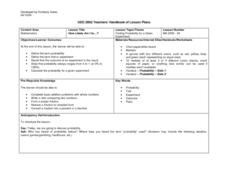Curated OER
Prime Time
Seventh graders practice determining the prime factorization of composite numbers. They create Christmas factor trees for prime numbers greater than 100. They decorate their final products with markers, crayons, colored pencils, glitter...
Curated OER
Estimating Solutions to Word Problems
Fourth graders explore number sense by completing word problems in class. In this estimation lesson, 4th graders define terms such as sum, difference, estimate and best. Students complete estimating worksheets based on the concept of...
Curated OER
Periodic Table
In this periodic table worksheet, students determine why the periodic table is organized the way it is and compare and contrast the characteristics of the different grouping of elements. This worksheet has 22 short answer and 36 fill in...
Curated OER
Internet Field Trip on Fractions and Geometry
Students take an Internet field trip to research fractions. ESOL strategies include using pattern block manipulatives and pairing ESOL and non-ESOL students on computers.
Curated OER
Equivalent Fraction Munch with Pizza Pie
Students demonstrate fractions and mixed numbers using concrete pictorial models of pizza. They relate symbols to the models.
Curated OER
Finding PI
Students select and use appropriate operations, methods and tools to compute or estimate using whole numbers. They develop and use formulas for determining the circumference and area of circles. Students determine and describe the...
Curated OER
Counting Zero to Five
Students are introduced to the numerals zero through five. They associate the numeral with the correct number of objects. Students comprehend the quantities zero through five showing "How many?" by counting their fingers or using a...
Curated OER
Algebra: What's My Rule?
Students apply higher level thinking skills to determine rules for sorting and classification. In this pre-algebra lesson plan, students nominate classmates who they think satisfy the unspoken "rule" established by the leader. As...
Curated OER
Value Your Digits
Third graders work with place value. In this place value lesson, 3rd graders write three digit numbers and tell the place value of each number. They compare numbers and money, regroup, discuss the value of coins, and count money.
Curated OER
Apple Estimation: Percentages & Subjective Reasoning
Students practice using their estimation skills by utilizing apples. In this percentage lesson plan, students utilize a scale and an apple to discover the percentage of each bite they take. Students share their data with the rest of...
Curated OER
Understanding number to 100
Students research equivalent representations of numbers using the base 10 system. In this Base 10 lesson, students examine place value, representations of numbers, and multiples of one, ten, and one-hundred.
Curated OER
Camouflage
Here is a lesson which incorporates ingenious hands-on activities that simulate how many animals use camouflage as a survival technique. This lesson clearly outlines how to implement the activities and discussion sessions found in it....
Pennsylvania Department of Education
Comparing Sets
Students count back with cubes to model subtraction problems. In this subtraction lesson plan, students compare sets of problems and record their results in a table.
Curated OER
Going Whole Hog
Students participate in a game in which they compare fractions and graph the fractions.
Curated OER
Compare and Arrange Whole Numbers Up to 100
Number whizzes investigate integers by arranging them in a specific order. They utilize whole numbers which are given to them and then put them in order up to 100. They also practice using "greater than" or "lesser than" symbols.
Curated OER
Representing Rational Numbers
Seventh graders explore rational numbers. In this fractions, decimals, and percents lesson, 7th graders identify and compare equivalencies between fractions, decimals, and percents. Students use hands-on activities to investigate the...
Curated OER
Introduction to Decimals
In this math worksheet, students are introduced to decimals by first studying pattern blocks showing a number with tens, ones and tenths. Students locate decimals on number lines and rulers and shade decimal pictures. Students compare...
Curated OER
Probability: How Likely Am I to...?
Twelfth graders examine various ways probability is applied to daily situations. They use marbles and blocks to calculate the probabilities of picking certain colors. They also calculate the odds of picking a winning raffle ticket.
Curated OER
Approximate Solution to an Equation
Students solve equations through trial and error. In this algebra activity, students first estimate their answers and then calculate it to check their work. They solve problems involving roots and integers.
Curated OER
What Are We Listening To?
Students gather data from a web site on number of music albums sold by genre for the last two years. They convert these figures to fractions, decimals, and percents, and display the results in bar graphs and pie charts.
Curated OER
To Be Or Not To Be... (Hamlet)
Students complete a unit of lessons on William Shakespeare's Hamlet. They analyze the plot, themes, and characterization, relate songs to thematic issues, develop plot summaries and translations, and compare the play to a movie version.
Curated OER
The Economic Differences Between the North and the South Prior to the Civil War
Seventh graders identify and explain the economic differences between the North and the South incorporating photographs and a Venn Diagram to interpret the two sides. They complete a KWL and T-chart to assist them with their task for the...
Curated OER
Count Down the Days to a Special Event
Students calculate time using a grade appropriate skill. In this time instructional activity, students calculate the time to a special event. Students calculate days, months, weeks, hours, minutes or seconds depending on their skill...
Curated OER
Subtracting Whole Numbers and Decimals
In this math worksheet, students learn to subtract whole numbers and decimals. Students are given step by step directions on how to solve one sample problem, then complete 5 examples on their own. Example: 6.57 - 3.28. There is...

























